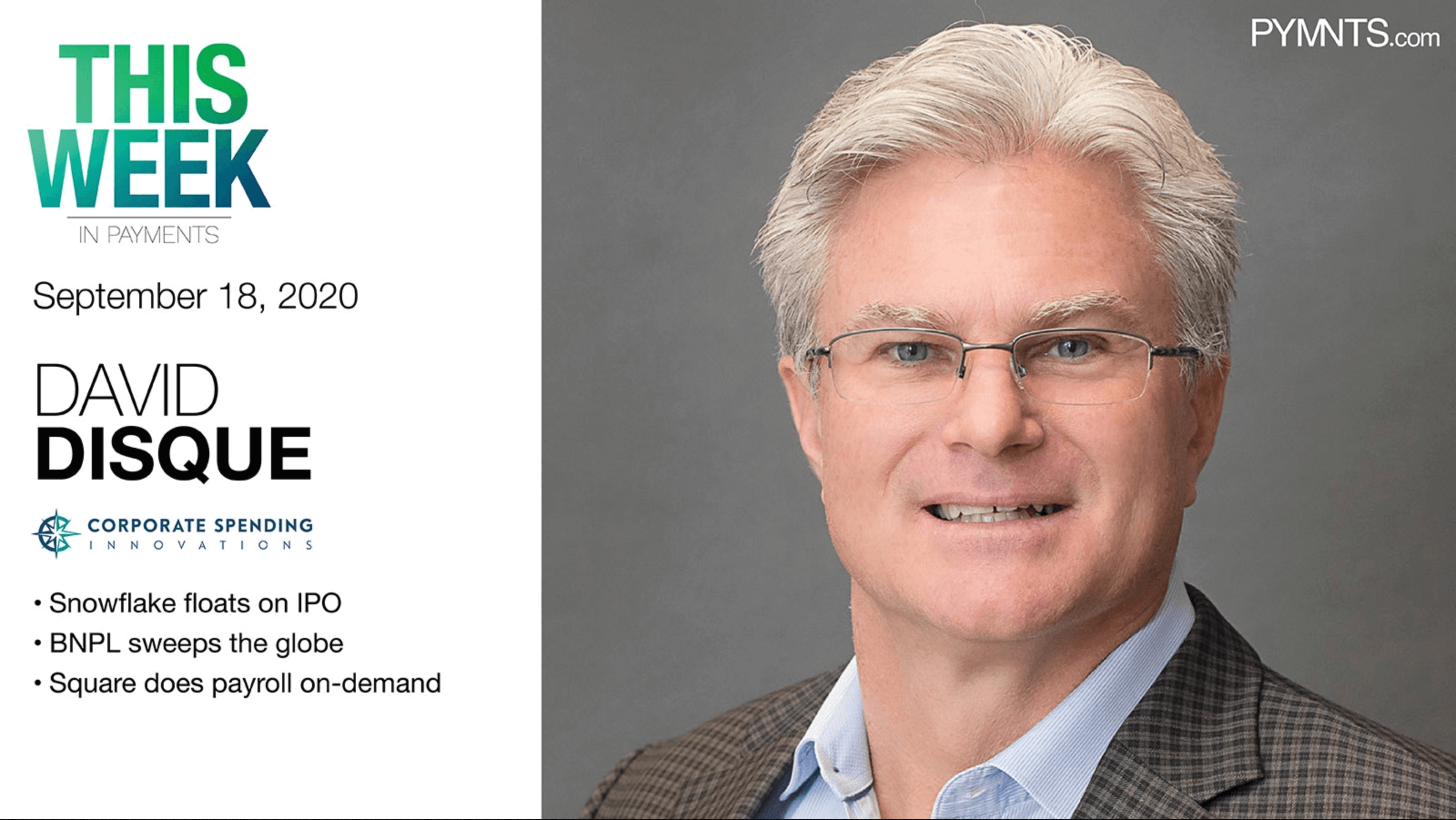This week saw cloud-storage software maker Snowflake’s initial public offering (IPO) pop an unprecedented 111 percent, Swedish-based alt-credit provider Klarna’s valuation hit $10 billion and instant disbursements make their next great leap forward as Square rolled out instant payroll services. Corporate Spending Innovations President David Disque joined Karen Webster for PYMNTS’ latest edition of “This Week In Payments” to talk about what it all means for the digital economy.
“There’s a lot of rethinking [and] also restructuring of how the workflow is going to occur in a digitized world,” Disque told Webster. “The tools are out there today. There are so many great tools and platforms to facilitate all of these processes in a very elegant way. So the good news is, as companies make this shift and now have the urgency to make the shift, there are a lot of great resources and tools that they can tap into very efficiently.”
Here are excerpts of their discussion:
Snowflake’s Big IPO Bounce
Webster noted that Snowflake enjoyed what’s reportedly the biggest software IPO in history, and Disque added that while big numbers are always exciting, what Snowflake did is far more interesting for what it portends. He noted that Snowflake’s service provides companies with new ways to store and access data in the cloud instead of relying on databases linked to hardware.
“I think it’s pretty exciting,” Disque said. “It reflects the fact that every company is on its own digital transformation path, whether you’re a young company or a legacy player. I mean, it is now top of mind for a variety of reasons, including [the fact that] having access to data has never been more important in the ecosystem.”
He added that Snowflake’s central offering is a Software-as-a-Service (SaaS) data warehouse that’s faster, easier and more flexible than traditional data storage.
That provides a foundational offering that’s appealing to any player that offers up digital service to customers.
For instance, Disque said it gives firms like his the ability to do what they do better for their customers — a critical capability, particularly in the post-pandemic environment.
He said that means Snowflake likely isn’t going to be a one-off, whiz-bang IPO, but will probably represent the start of lots of firms that bring value-added offerings to the digital ecosystem stepping into the spotlight.
“I think these types of platforms have a lot of interests out there in the market, and I think you’re going to see a lot more excitement,” Disque said. “There is a lot of consolidation happening out there now, and I think we are even seeing it spill into the FinTech market. There is just a lot of activity out there.”
He said COVID-19 might have slightly dented that activity early on, but that the digitization the pandemic spawned has ultimately boosted things.
Alternative Finance’s Growth Spurt
Alternative credit players have been appearing in the headlines a lot of late. Apart from Klarna’s big valuation level-up, Affirm raised another $500 million and consumers’ rush into buy now, pay later offerings (BNPL) has been making headlines all summer.
Webster wondered if consumer credit is being disrupted by all the new players, or whether the new entrants are merely enhancing it.
From Disque’s position, it looks more like an enhancement than a disruptor, although it’s certainly a powerful enhancement — with lots of attraction for both sides of the transaction.
He said merchants in general enjoy massive conversion boosts — often 30 percent or more — by offering flexible financing options such as BNPL. Disque said that given the incredible strain the pandemic has put on revenues, that kind of conversion boost is critical.
And for consumers — who’ve also been hit hard economically by the pandemic — installment payments offer a level of control that’s hard to compete with, building transparency and predictability into repayment. That’s why Disque believes the market for such products will grow as the economic recovery rolls on.
“I think you’re going to see a lot more activity in that particular market, especially now with a lot of the small [and] medium-sized businesses struggling,” he said.
“I feel they’re going to be looking for more creative and alternative sources to capture more conversions, boost their cash flow and run their businesses more efficiently in this more difficult time.”
Square’s Next Leap Forward On Instant Payments
Square this week captured some serious headlines with its announcements of two new products: Instant Payments and On-Demand Pay.
Instant Payments allows employers to fund payroll in close to real time. That will eliminate the lag of up to four business days between when funds leave an employer’s account and when they arrive in employees’ accounts. Workers and contractors who’ve elected to be paid via the Square Cash App will receive their money within minutes, while those paid via direct deposit will get their pay as soon as the next business day.
Meanwhile, On-Demand Pay allows workers to have $200 of their earned wages in each pay period transferred to their accounts early for a low fee.
Disque said instant payments are seeing big growth in areas like payroll and other B2C applications, but have yet to make a big impact in B2B transactions. But he has no doubt they’ll get there some day, with progress already happening.
For example, he’s seeing banks launch more real-time payment initiatives. Card-based payments are showing up in more B2B transactions, providing lots of real-time payments’ benefits via a different mechanism. Disque is also seeing check usage continue to fall in B2B as more firms move away from paper invoicing and payments.
He added that even where paper persists, it’s at least getting digitally upgraded.
“Even if a check’s still going out in the mail, you don’t have to be in the office to approve it and have it printed and sent out,” Disque said. “We’re seeing a lot of businesses start to take action on how they automate some of these legacy processes around payment and invoicing and put more efficient processes in place. There are a lot of opportunities just in the digitization of payments. And even the legacy type payments can now be digitized.”
He said progress is happening now largely because it has to. After all, few firms are motivated to change when things are going well. But when trouble shows up, even the most entrenched of legacy players find they can develop enthusiasm for thinking differently — if it lets them navigate to their future more smoothly and efficiently.
——————————
LIVE PYMNTS TV OCTOBER SERIES: POWERING THE DIGITAL SHIFT – B2B PAYMENTS 2021

Banks, corporates and even regulators now recognize the imperative to modernize — not just digitize —the infrastructures and workflows that move money and data between businesses domestically and cross-border.
Together with Visa, PYMNTS invites you to a month-long series of livestreamed programs on these issues as they reshape B2B payments. Masters of modernization share insights and answer questions during a mix of intimate fireside chats and vibrant virtual roundtables.



